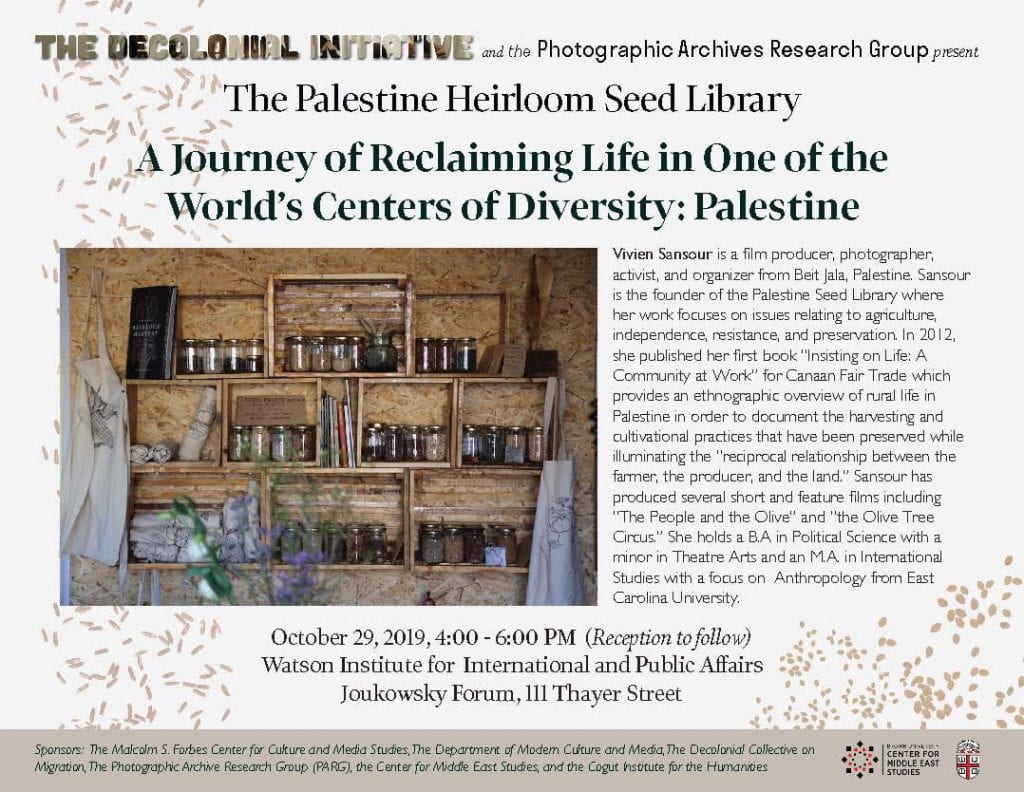
The Palestine Heirloom Seed Library A Journey of Reclaiming Life in One of the World’s Centers of Diversity: Palestine
In Arabic the generous ones are referred to as the people of the soil, ahl Al athra. The Arabic language has other references to soil as the mother of us all; but the most telling of terminologies is the word for plant and seed, Zareea’, which is the same word used for children. But these sayings that have been passed down to us are just a few in the abundant dictionary of words endangered in a global reality that values plastic more than life. (Vivien Sansour)
Part of the Fertile Crescent, Palestine has been considered one of the world’s centers of diversity, particularly for wheat and barley. This biodiversity, which has kept us alive for millennia, is being threatened by policies that target farmers and force them to give up their heirloom seeds and adopt new hybrid varieties. Heirlooms, which have been carefully selected by our ancestors throughout thousands of years of research and imagination, form one of the last strongholds of resistance to the privatization of our life source: the seed. These seeds carry the DNA of our survival in a violent context that is seen across the hills and valleys through settlement and chemical expansions.
Heirloom seeds also tell us stories, connect us to our ancestral roots, remind us of meals our families once made at special times of the year. The Palestine Heirloom Seed Library is an attempt to recover these ancient seeds and their stories and put them back into people’s hands. The Seed Library is an interactive art and agriculture project that aims to provide a conversation for people to exchange seeds and knowledge, and to tell the stories of food and agriculture that may have been buried away and waiting to sprout like a seed. It is also a place where visitors may feel inspired by the seed as a subversive rebel, of and for the people, traveling across borders and checkpoints to defy the violence of the landscape while reclaiming life and presence.
In her talk, Vivien will discuss the work of the Palestine Heirloom Seed Library, El Beir, Arts and Seeds, and the Traveling Kitchen, all located in the village of Battir, a UNESCO World Heritage Site in Palestine.
Vivien Sansour is a film producer, photographer, activist, and organizer from Beit Jala, Palestine. Sansour is the founder of the Palestine Seed Library where her work focuses on issues relating to agriculture, independence, resistance, and preservation. In 2012, she published her first book “Insisting on Life: A Community at Work” for Canaan Fair Trade which provides an ethnographic overview of rural life in Palestine in order to document the harvesting and cultivational practices that have been preserved while illuminating the “reciprocal relationship between the farmer, the producer, and the land.” Sansour has produced several short and feature films including “The People and the Olive” and “the Olive Tree Circus.” She holds a B.A in Political Science with a minor in Theatre Arts and an M.A. in International Studies with a focus on Anthropology from East Carolina University. More on Sansour can be found here.